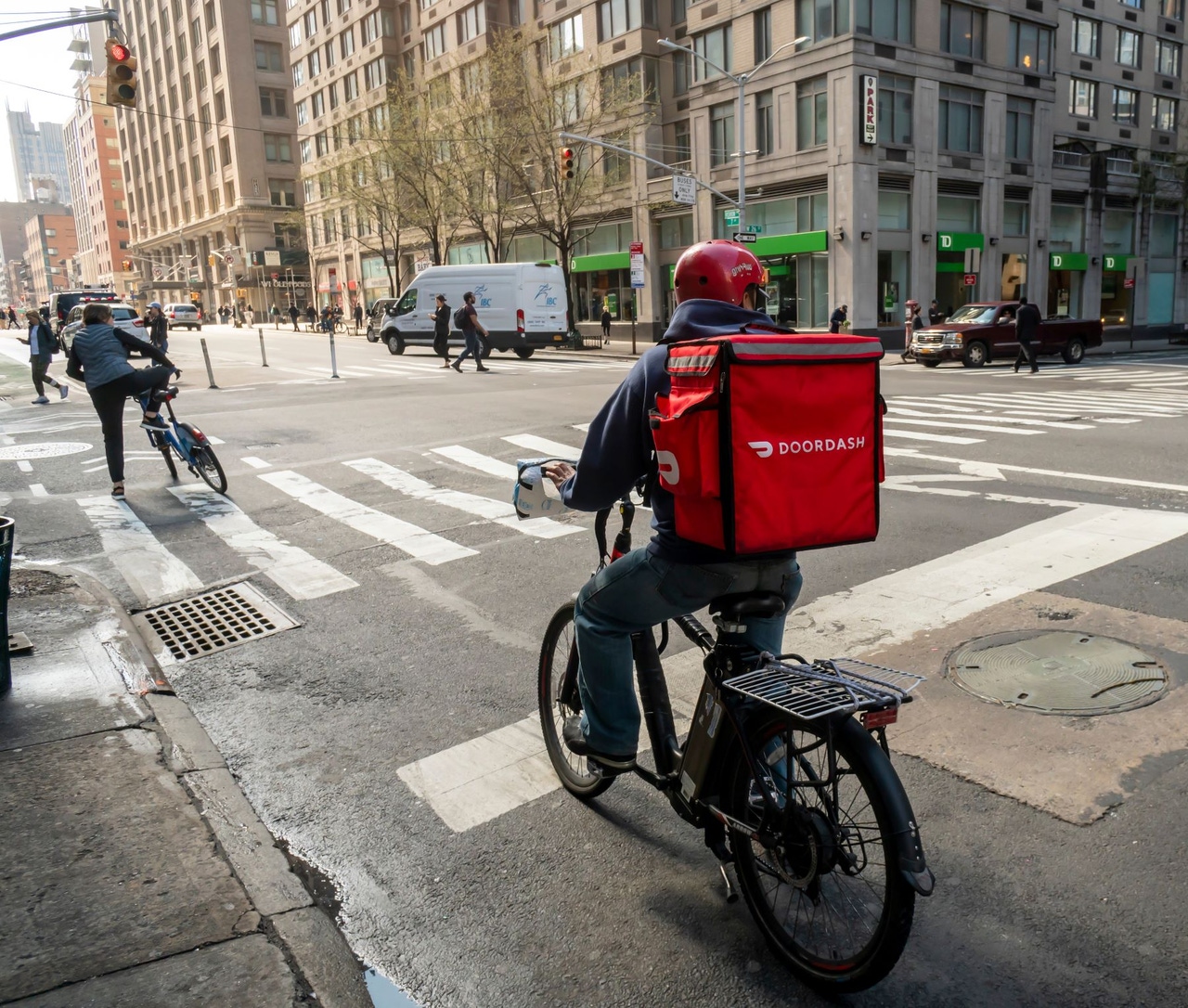DoorDash, Grubhub, Uber Eats, Relay sue NYC over minimum wage hikeDoorDash, Grubhub, Uber Eats, Relay sue NYC over minimum wage hike
The lawsuits, filed Thursday in New York's Supreme Court, argue that the minimum wage hike of $19.96 an hour imposed in June is an extreme standard for the food delivery companies.

Grocery and restaurant delivery services DoorDash, Uber Eats, Grubhub and Relay filed lawsuits against the city of New York Thursday over a new minimum-wage imposed by the city for the companies' delivery drivers.
The lawsuits, filed in the New York Supreme Court, argue that the minimum wage hike of $17.96 an hour imposed in June (the wage is scheduled to increase to $19.96 by 2025) is an extreme standard for the food delivery companies.
DoorDash called the new wage arbitrary and based on "dubious methodology."
“Bad policies cannot go unchallenged, and we will not stand by and let the harmful impacts of this earnings standard on New York City customers, merchants and the delivery workers it was intended to support go unchecked,” a DoorDash spokesperson said in an email response to WGB. “We—and others — clearly and repeatedly warned the city that using such a flawed process to underpin its rulemaking would have lasting and harmful impacts for all New Yorkers who use these platforms, but the approach that DCWP (Department of Consumer and Worker Protection) took was sadly not one that reflected this, and has left us no choice but to take our concerns to court.”
One of the lawsuits, filed by DoorDash and Grubhub, argues that the city’s decision was based partly on a biased questionnaire that asked delivery drivers “leading questions" about pay to justify the wage hike.
DoorDash added that the new wage requirement is unfairly imposed on restaurant deliveries but not grocery deliveries, in some cases, the company said in a press release.
“For instance, why would the agency choose to purposefully exclude companies that only facilitate grocery deliveries from its study and rulemaking, when those that facilitate both restaurant and grocery deliveries from local businesses would have these rules apply to them? A worker can now be subject to different legal standards for identical orders from identical local businesses, based solely on the platform they choose to accept the order from,” the company stated.
A DCWP representative could not immediately be reached for comment, but the department and city issued a statement following the passage of the wage ordinance, which noted that the average delivery worker in New York makes $7.09 an hour.
“Getting Stuff Done for working people is what this administration is all about, and that includes some of the hardest working New Yorkers: our delivery workers,” New York City Mayor Eric Adams said in a statement when the wage ordinance was passed on June 11. “Our delivery workers have consistently delivered for us — now, we are delivering for them.
But while the city argued for workers, DoorDash said Thursday that the new law would hurt consumers who will have to pay more for their deliveries. “These are impacts that will often be felt by those who can least afford them: busy families who depend on the accessibility and convenience of delivery, small restaurants working tirelessly to grow their businesses, or delivery workers seeking opportunities for extra income to make ends meet,” the San Francisco-based company said.
DoorDash adds pay flexibility
The lawsuit from DoorDash and others comes just a few weeks after the company announced it is creating more flexibility in how its drivers get paid. DoorDash delivery drivers, often referred to by the company as Dashers, now have a new option to receive an hourly wage rather than getting paid by the size of the order and distance the driver must travel.
The company announced the change at the end of June along with a wide variety of tech updates to the delivery service app in celebration of the company’s 10-year anniversary. Dashers will still receive tips, no matter the payment method they choose, the company said.
“Throughout, Dashers have consistently told us that flexibility and choice are overwhelmingly the key reasons they choose to dash,” DoorDash said. “Our business has evolved beyond just facilitating single orders from single restaurants and today, Dashers have more choice than ever when it comes to how they want to earn–from in-store shopping to package pickup and more.”
Dashers can switch up how they’re compensated from delivery to delivery under the new system, choosing hourly pay for some and pay-by-delivery for others.
DoorDash has also updated other features for drivers and their customers; for example, customers can now add tips for up to 30 days following a delivery. “With this new feature, we’re also implementing new nudges and reminders to encourage customers to tip after delivery,” the company said.
Drivers can also use the company’s “Dash Along the Way” feature, which allows them to receive offers in the zone or area they designate as their starting point, “reducing downtime and helping Dashers maximize their earnings potential,” the company said.
The delivery platform also has added a safety feature that allows drivers to share their location with up to five contacts who can then track their movements. It also enables those contacts to see if a delivery is in progress or completed or if a 911 emergency call has been placed by the driver.
Along with the new pay options, DoorDash announced that it’s giving a one-time gift of $10,000 to its drivers who have been with the company since its inception and have completed more than 10,000 deliveries.
“As DoorDash has evolved over the years, one thing has remained constant: our commitment to providing millions of people the ability to reach their financial goals by earning supplemental income how, when and where they want,” the company said. “We’re honored to continue this mission by providing Dashers with unprecedented choice in how they earn, helping them maximize their earnings on our platform, and providing them with even greater peace of mind.”
The changes in pay options come in the wake of a number of lawsuits against delivery services such as DoorDash and Instacart on their payment structures.
Instacart reached a $46.5 million settlement with the city of San Diego in October over a lawsuit claiming the company underpaid its drivers from 2015 to 2020 and ran afoul of California law by classifying them as independent contractors rather than employees.
DoorDash was ordered to pay $5.3 million in 2021 in a similar case in San Francisco. “This is the city’s second major settlement directly benefiting delivery app workers in San Francisco,” City Attorney David Chiu said in a statement at the time of that settlement. “We hope this sends a strong message that the city aggressively investigates compliance with our labor laws and works hard to ensure workers are treated fairly.”
* This article was updated to correct the amount drivers are paid under the new ordinance.
About the Author
You May Also Like






